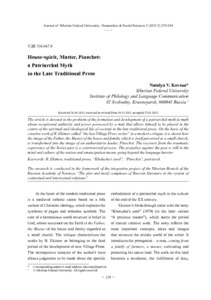Домовой, Хозяин, Пиночет: патриархальный миф в поздней традиционалистской прозе
Скачать файл:
URI (для ссылок/цитирований):
https://elib.sfu-kras.ru/handle/2311/2708Автор:
Ковтун, Н.В.
Kovtun, Natalya V.
Дата:
2012-02Аннотация:
The article is devoted to the problem of the formation and development of a patriarchal myth (a myth
about exceptional authority and power possessed by a man that allows himself to be placed in the
centre of the spiritual and ideological life of society) in the late traditional prose. On the basis of the
creative work of B. Ekimov called the last Village Prose writer in a modern critique, it is shown how
the image of the Father, the Master of the house and family, which is itself perceived as a small church,
is transformed into the image of an authoritative leader, Pinochet. The recovery from the traumatic
experience of the Soviet past is a controversial process. The prejudice against the past is still in the
mind and culture of the nation and emancipation means going beyond the language barrier. Статья посвящена проблеме становления и развития патриархального мифа (мифа об
исключительном авторитете и силе, которыми обладает мужчина, и которые позволяют
ему стать в центр духовной, идеологической жизни общества) в поздней традиционной
прозе. На материале творчества Б. Екимова, названного в современной критике последним
деревенщиком, показан процесс трансформации образа Отца, Хозяина дома как малой церкви
в образ руководителя авторитарного типа, Пиночета. Изживание травматического опыта
советского прошлого - процесс неоднозначный, предрассудки минувшего остаются в сознании,
культуре нации, когда освобождение означает выход за грань самого языка.

